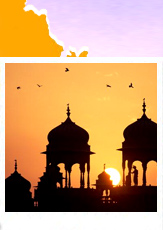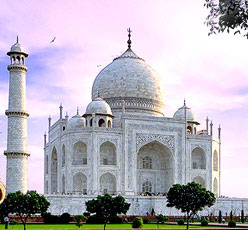 An enormous open-air bas-relief made on two huge
boulders at Mahabalipuram, Arjuna's Penance is a sculptural marvel. It
is 31 m long and 9 m high and its surface has detailed carvings
depicting animals, as they would appear in their natural surroundings.
There is a controversy as to the origins of this bas-relief. While some
believe that it shows Arjuna undertaking a penance to obtain a rare
weapon against his enemies, others believe that it depicts Bhagiratha in
penance to bring River Ganges to earth. According to the latter, cleft
appeared in the rock dividing the canvas in two, symbolizing the Shiva's
response to Bhagiratha's penance. According to Ferguson and Burgess, the
sculptured 'Nagas' on the cleft suggests that this bas-relief represents
'Serpent Worship' prevalent in ancient India and that in the cleft,
there has been a statue of the great Nagaraja. It was in his honor that
the great bas-relief was designed.
An enormous open-air bas-relief made on two huge
boulders at Mahabalipuram, Arjuna's Penance is a sculptural marvel. It
is 31 m long and 9 m high and its surface has detailed carvings
depicting animals, as they would appear in their natural surroundings.
There is a controversy as to the origins of this bas-relief. While some
believe that it shows Arjuna undertaking a penance to obtain a rare
weapon against his enemies, others believe that it depicts Bhagiratha in
penance to bring River Ganges to earth. According to the latter, cleft
appeared in the rock dividing the canvas in two, symbolizing the Shiva's
response to Bhagiratha's penance. According to Ferguson and Burgess, the
sculptured 'Nagas' on the cleft suggests that this bas-relief represents
'Serpent Worship' prevalent in ancient India and that in the cleft,
there has been a statue of the great Nagaraja. It was in his honor that
the great bas-relief was designed.However, the people advocating the theory of Arjuna interpret the ascetic doing penance as the third of the five Pandavas while those advocating theory of Bhagiratha identify the personage as the Bhagiratha and call this great sculpture as Bhagiratha's penance. Arjuna's Penance presents a deftly sculpted scene depicting man's view of the universe with over 100 figures of gods and semi divine creatures, birds and beasts, men and saints. All the figures are carved so that they either face the fissure or seem to approach it and have their hands folded in reverence. On the left of the fissure is a simple temple of Lord Shiva. There is a forest with tribal people and all forms of animal life. A touch of humor can be seen as a cat is standing doing penance, while big and small rats are freely playing around it. There is also the lively monkey family that looks appealing and makes one ponder its resemblance with the intense and naive love of life that characterizes the Buddhist art at Sanchi.









